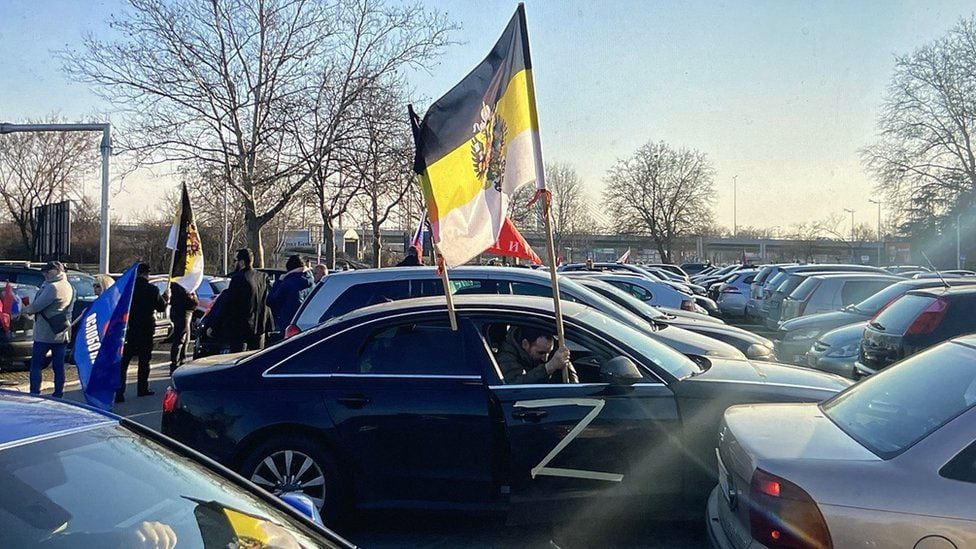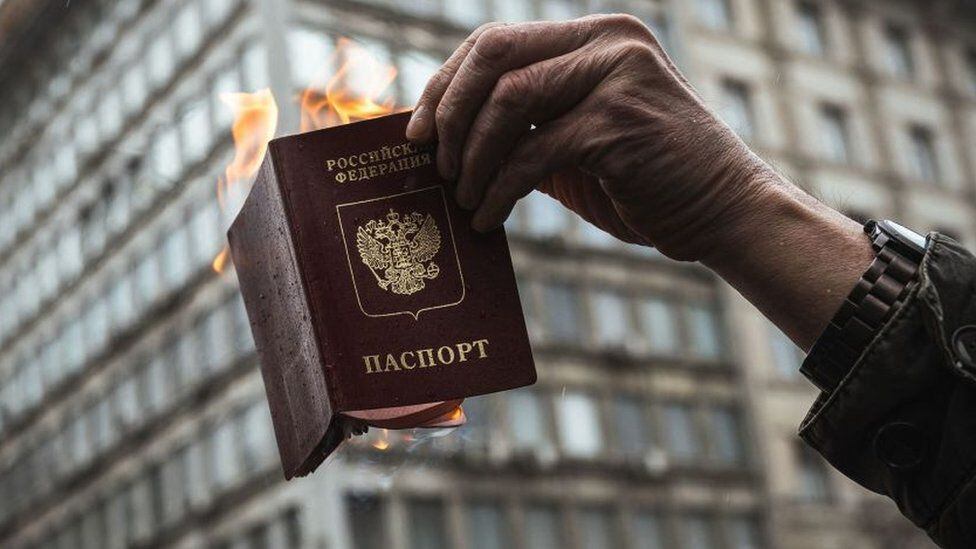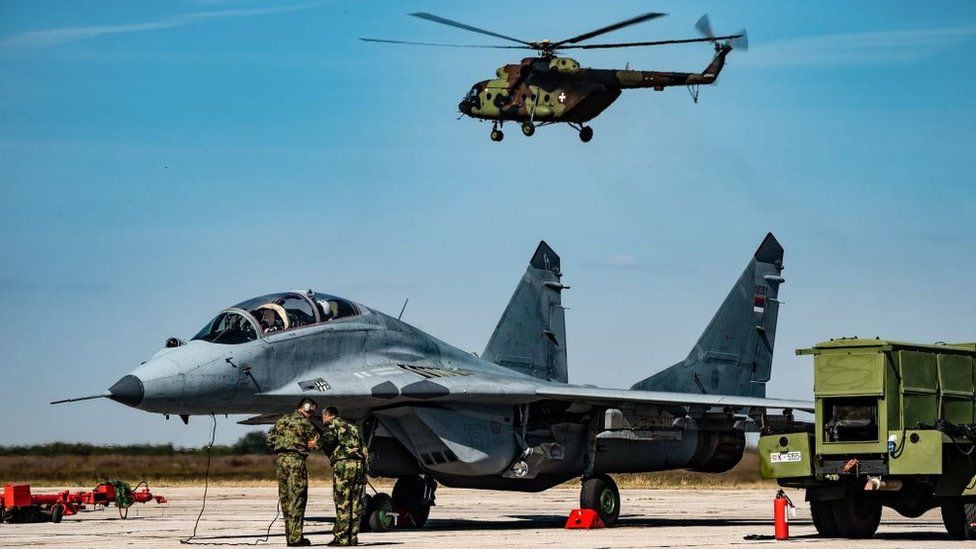It is the only one of the countries seeking membership of the European Union (EU) that was unanimous about not imposing sanctions on Russia for attacking Ukraine, although it has condemned such aggression.
It is the only European capital where thousands march in support of Putin’s aggression towards neighboring Russia, although Belgrade was also the scene of an anti-war protest.
Serbia – which declared itself a neutral country in December 2007 – wants to join the EU, but is conducting military exercises with Russia (and also with the North Atlantic Treaty Organization, NATO).
Belgrade is tied to Moscow by its dependence on Russian gas, but also by a sense of historical kinshipexemplified by the fact that Moscow does not recognize Kosovo’s independence from Serbia, declared in 2008. (Strictly speaking, Ukraine has not recognized Kosovo either).
Serbian officials note that their apparently contradictory position is based solely on “respect for international law and justice”, but it seems clear that economics, politics and emotions are also highly influential in policy making.
Then, where are the interests of Serbia?
Neither sanctions nor meetings with Russia
He has been in power for a full decade, but Serbian President Aleksandar Vucic says he has never been more tired than he is now.
Just three days after the invasion began, he announced that Serbia would not take action against Russiasince “it considers that it is not in its vital interest to introduce sanctions against any State”.
Since then there have been numerous phone calls with Western leaders and a visit to Belgrade by German Foreign Minister Annalena Baderbock.
The question of Serbia’s position is being thoroughly examined by its potential European partners.
“There was a clear condemnation of Russian aggression in the United Nations General Assembly, and we saw the Serbian decision to join positive,” Baerbock said, after meeting with President Vucic.
However, when asked about the lack of sanctions on Russia, Baderbock suggested that it may have been discussed at the meeting, but declined to elaborate during the news conference.
The Serbian president made one thing very clear: he claimed that he had not spoken to any of the Russian officials since the war began.
But the absence of sanctions was already favoring his nationand no one benefited more than Air Serbia.
The national airline, which is co-owned with Etihad airlines, increased the number of flights between Belgrade and Moscow to up to 15 a week, from just one a day.
After public criticism, including from Ukraine, and the fact that several flights were canceled due to bomb threats, President Vucic ordered a review of the airline’s policy.
However, he also stressed that Turkish airlines are not being publicly shamed for flying to Russia.
Officials in Belgrade say that Serbia still wants to join the EU, despite another breach of EU policy towards Russia.
When Russia annexed Crimea in 2014, Serbia also refused to impose sanctions. about that country, saying only that the territorial integrity of Ukraine should be respected.
The “Z” in the streets of Belgrade
The symbol representing Russian aggression in Ukraine can still be seen in the center of Belgrade, although obviously not on military equipment or armored vehicles.
At the end of March, several people demonstrated in the streets with their cars with Russian and Serbian flags, showing support for Vladimir Putin and the war that started in Ukraine.
In a meeting supported by nationalist organizations, the demonstrators chanted about the eternal brotherhood between Serbs and Russians.

However, the Serbian authorities claim that the support is only verbal. The Ministry of Defense denied the accusations. from the Ukrainian general staff that Serb fighters had joined Russian forces in the country.
The war also became an election campaign issue in Serbia, as the country celebrated a general election on April 3, from which Vucic emerged re-elected.
Far-right candidate Misa Vacculo, notorious for his nationalist and homophobic comments, officially declared his presidential candidacy driving a Japanese car marked with a makeshift “Z” on the door.
But it was not just the Russian flag that was being flown in Belgrade. A couple of weeks ago, a march in support of Ukraine was held in the heart of the Serbian capital and a Russian citizen burned his passport in protest.

Gazprom and Kosovo
It was in 2008 that two events, of great importance for Serbia, brought Belgrade and Moscow closer together.
In February of that year, Kosovo declared its independence from Serbiabut Russia stood firm against change of borders, coinciding with the Serbian position.
Then, in December, Serbia and Russia signed a state deal that saw Russian energy giant Gazprom take a 51% stake in Serbian oil and gas company NIS.
This double dependency, in international and energy policiesis often seen as the key denominator in relations between Serbia and Russia.
How close are the military ties?
Gazprom and Kosovo
It was in 2008 that two events, of great importance for Serbia, brought Belgrade and Moscow closer together.
In February of that year, Kosovo declared its independence from Serbiabut Russia stood firm against change of borders, coinciding with the Serbian position.
Then, in December, Serbia and Russia signed a state deal that saw Russian energy giant Gazprom take a 51% stake in Serbian oil and gas company NIS.
This double dependency, in international and energy policiesis often seen as the key denominator in relations between Serbia and Russia.
How close are the military ties?
There was a grand ceremony at Belgrade’s military airport when, in 2017, the first batch of second-hand Russian MIG-29 aircraft parts – a “donation” as the Serbian government called it – arrived.
It was a public demonstration of cooperation between the two Armed Forces, although many of the details about the state of the planes and the reconstruction and reconfiguration plans remain unknown to this day.
This cooperation is much more visible to the Serbian public when the two armies conduct a joint military exerciseoften accompanied by Belarus.

Extensive reports in the pro-government media create the impression that the Serbian military has deeper connections to the east than to NATO.
However, in one of the few times that data was obtained from military officials, the Balkan Security Network published in 2019 that the Serbian Army had carried out 17 joint training operations with foreign counterparts, of which 13 were NATO members.
More than 14 years have passed since Serbia formally declared its neutrality to all existing military alliances.
This position has been challenged before, as most countries in the region have become NATO members.
While announcing the official position on the war in Ukraine, President Vucic added that Serbia is canceling its participation in all joint operations with all foreign partners.
This is not the first time such a decision has been made. In 2020, when the crisis with Belarus was at its peak after the disputed result in the presidential elections, Serbia decided to impose a moratorium on any military exercises with any of its partners for six months.
But it’s not just the Army whose actions are being scrutinized.
In 2021, Russian opposition politician Vladimir Kara-Murza claimed in an interview with a pro-opposition Serbian tabloid that Serbian authorities secretly followed and recorded his meetings in Belgrade.
He added that the findings were shared with Russian intelligence.
The Serbian Interior Minister, who was personally accused by Kara-Murza of sharing the data with Russian Security Council Secretary Nikolay Pathushev, denied these accusations and announced that he would file charges in both Serbia and Russia against Kara-Murza.
However, it is unknown if any legal action was initiated.
Now you can receive notifications from BBC World. Download the new version of our app and activate it so you don’t miss out on our best content.
Source: Elcomercio

:quality(75)/cloudfront-us-east-1.images.arcpublishing.com/elcomercio/KL77CKM5DNEA5DOG3D35VGZMKQ.jpg)





